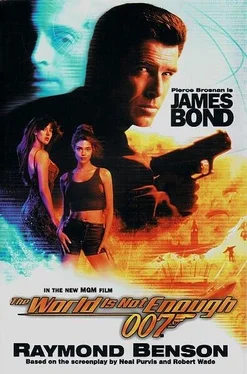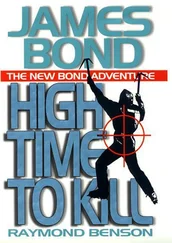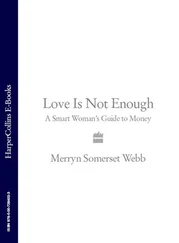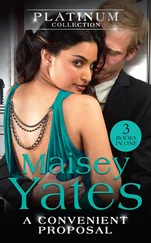‘. . . needs constant attention,’ Bond said, lapping the drips from the top of her right breast.
She slid her tongue back and forth along the groove above the tendon. She had already proved that she could do things with her tongue that most men only dreamed about, and this was no exception.
‘Enough ice for one day,’ Bond said, as he gently took the ice out of her hand and tossed it across the room.
The passion took over for a second time that night.
Later, after they were spent, Bond opened a bottle of vintage champagne and the pillow talk began again. As he caressed her naked back, tracing the curve of her spine, she asked him about his life. He revealed what he told most lovers, concentrating mostly on the world’s trivialities that interested him. They talked of food and drink, travelling, and about the thrill of sport. They shared a love for skiing and the rush of adrenaline it provided. They listed what they loved and hated about London. She spoke of music and art, and he expressed an admiration of Eastern philosophy. They discussed sex and what they each found desirable. She admitted that none of her former lovers had come near satisfying her the way Bond had.
She told him of her dreams and goals, and how she wanted to make her lather’s company a world player. ‘When I was a little girl,’ she said, ‘I played “princess” a lot. My father spoiled me. He used to call me his little princess. He would tell me that when I grew up, I really would be a princess. It sounds horrible, but I suppose I’ve always believed that. It inspired me to work at it, though. Even though he spoiled me, I never took it for granted. I miss him.’
‘I was under the impression that you and your father didn’t get along,’ Bond said.
She laughed. ‘Who told you that? Davidov, I would imagine. That’s only because he had the pleasure of seeing us when we did quarrel. I said my father was good at quarrelling: well I think I inherited that attractive trait from him. We could get into furious fights over business decisions, but it didn’t mean we didn’t love each other. I respect my father and he respected me. I earned my place in King Industries. I worked hard at university. And he knew I had what it took.’
‘My superior at MI6 thought very highly of him,’ Bond said.
‘Dear M,’ Elektra said. ‘What a lady. She is very maternal toward me.’
‘Tell me about your mother,’ Bond said.
‘She was very kind, but quiet and shy. Introverted. She spoke very quietly, almost in a whisper. She came from a very cultured family that wasn’t very smart in business, I’m afraid. My father, well, he saved their business, but he had to take it from them to do it. My mother died when I was six years old. It was one of those cancers that hit unexpectedly and spread rapidly. I don’t remember a lot about it except that it was a very painful time in my life. To tell the truth. I don’t remember too many happy times before then, either.’
‘Why is that?’
‘My parents . . . they quarrelled. A lot. It’s practically the only thing I remember about their relationship. Come to think of it, I think they mostly quarrelled about me. Sometimes I wonder why they got married. Oh, I’m sure they loved each other, but they were very different people. Two different cultures. Even so, my father was constantly at her side during the illness, and she died in the hospital, holding his hand.’
‘I’m sorry.’
‘I look back and I realise that I don’t have too many memories of my mother. After all, I was young when she died. I remember a lullaby that she used to sing to me. It’s one of the few pleasant memories I have of her,’
She began to sing, slowly and softly, a haunting melody. She looked up at him and smiled. ‘The first words have no meaning. The rest is “Calves entered the vegetable garden; gardener, drive away the calves, don’t let them eat the cabbage . . . Sleep my baby sleep, sleep and grow up, drive away the calves, nenni my little sweet baby nenni.” I never really got to know my mother. I don’t know why. She was afraid ... of something. I don't know what. Of life, perhaps.’
After a moment’s reflection, she continued. ‘As I grew up, I was the exact opposite. I couldn’t get enough out of life. I was my father’s princess. He promised me the would and I guess I got it before I thought I would.’
‘You seem to be doing a fine job running the company.’ ‘Thanks. You don’t know how passionate I am about finishing the pipeline. It’s something that will make history, I know it. I owe it to my father to finish it, certainly, but you
know what? I owe it to my mother more. If it hadn’t been for her family’s oil company, and their land that my father developed early on ... we wouldn’t be here today. My mother’s ancestors clung to their oil for years. It’s a matter of honour.’
She put into words what Bond found attractive about her. It was the passion she embodied — whether it was for her work, for sport, her love for her parents, or for the fervent sex that she so thoroughly enjoyed.
As he rubbed the muscles in her shoulders, Bond focused on an unusual jewel in her earlobe. It was the ear he had seen bandaged in the kidnappers’ Polaroid. The base of the diamond was wide, covering something on the skin.
Their eyes met. She knew what he was pondering. Tenderly, he reached out and touched the jewel. She didn’t stop him.
‘He used a pair of wire cutters on it,’ she said. ‘He said he was going to cut my whole ear off and send it to my father. I don’t know why he didn’t.’
‘Can you tell me about him?’
‘His name was Renard. I’ve heard him called Renard the Fox. I learned that from your people after . . . after it was all over. He was. . . horrible. He shouted a lot. He made me . . . do things. He hit me. He snipped my earlobe with wire cutters. It was three weeks of hell. I’m afraid I’ll never fully get over it/
Bond again thought of M’s directive not to let her know that it was Renard who was trying to kill her. He could discern that most of the time Elektra was fine and in control. She was a bit reckless, perhaps, but she seemed to be on top of the business. Nevertheless, he had seen glimpses of a vulnerable, frightened girl who most assuredly still had nightmares about the terrible tiling that had happened to her. Renard was probably the demon in her dreams, and it was best that she didn’t know he was close to her once again.
‘How did you survive?’ he asked her.
She closed her eyes and spoke slowly, as if she could only revisit the incident in the far reaches of her mind. ‘I seduced a guard. Used my body. It gave me control. There was one guard who couldn’t help himself. He had to have me. When the moment was right, I kicked him in his most vulnerable spot. I got a gun, and I just started shooting. I killed . . . three men. Renard wasn't there at the time or I would have killed him, too.’
She trembled a moment. The memory had struck a nerve. She pulled closer to him, nuzzling her face in his chest and stifling a sob. Another chill went down her spine and she shuddered again.
Bond was affected by the story of her ordeal, but he said nothing.
‘For someone so in love with life, I wanted to die,’ she said. ‘For months afterwards, I was a vegetable. But then . . . something snapped. I realised that I had to pull myself out of the lower depths. I hate to say it, but I think my father’s murder may have had something to do with shaking me back to the real world. Someone had to take charge.’ She paused a moment to take a sip of champagne. ‘But what about you? What do you do to survive?’
The truthful answer to that was that he never looked back. Bond didn’t want to reveal too much of himself, though. Instead, he turned the question around and focused it on her.
Читать дальше











